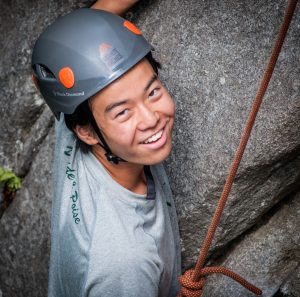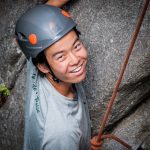Rock Climbing Classes

Great Day Climbing!
Introduction to Outdoor Climbing
Prerequisites:
None
Class Description:
First time climbers, families, and indoor climbers interested in outdoor climbing are encouraged to begin their experience here. This class will introduce climbers to the rudiments of rock climbing gear, knots, belay techniques, and basic movement in climbing. Interested parties will also be introduced to rope handling and management in longer classes. Like all of our classes, course content is tailored to each climber's personal climbing goals and needs.
Class Length:
1-2 days, longer courses more thorough.
Introduction to Outdoor Climbing

Group Climbing
Prerequisites:
None
Class Description:
If you are planning on bringing a large group to the crag, this is your class. We will learn the particular needs and goals of your group and develop the course content to meet your group's needs. Your day can be anything from a simple "plug-and-play" day where your groups members focus only on climbing fun, to detailed, sequential custom curricula (e.g. boy or girl scouts, camping staff training).
Class Length:
Any number of days based on needs of the group.
Group Climbing

Toprope Setup and Anchor Building
Prerequisites:
None. However, the course is customized to previous experience. Experience dictates depth and breath of instruction.
Class Description:
Climbing anchors are the core of safe climbing systems on rock, snow and ice. This course is a thorough introduction to rock climbing anchors, and the ideas herein transfer beautifully to snow and ice. An emphasis will be placed on building and analyzing bottom managed site anchors ("slingshot" setups) as well as top managed systems using both artificial and natural anchors, including V, N and combination rigs. Like all of our courses, the content is customized to our client's needs, and the course can also cover rigging and retreating from bolted and other fixed anchors. This course will help any indoor climber transition safely to the outdoor arena, and many experienced climbers report great gains in new techniques, technical knowledge, application, and anchor efficiency. Come learn with us!
Class Length:
2 days.
Toprope Setup and Anchor Building

Gym to Crag Class
Prerequisites:
Gym climbing experience and a genuine interest in learning to climb outdoors.
Course Description:
This course is for climbers that have gained experience in the climbing gym and want to smoothly transition to outdoor climbing. Outdoor climbing IS very different than indoor climbing, requiring different safety systems, setup skills, and climbing techniques. The course will not waste your time reviewing things you have already mastered in the gym. Instead, we will learn
- Objective hazards overview
- Rope selection, management, stacking, closing the system
- Modern, outdoor belay techniques, position and dynamics
- Knots and hitches
- Modern ground anchoring systems and when to use them
- Gear selection for outdoor climbing
- Rope setup and anchoring overview
- Terrain assessment and guide book interpretation
- Cleaning a top rope anchor for rappelling/being lowered
- Questions and Review
Class Length:
2 days recommended.
Gym to Crag Class

Sport Climbing
Prerequisites:
General climbing experience and a desire to learn sport leading.
Class Description:
Learning how to lead sport climbs (climbing from the ground up clipping bolts on the way for protection) opens up vast new territory for both the weekend warrior and dirt bag climber. While considerably less complex than learning to lead climbing placing protection with nuts and camming devices, sport climbing has its own risk management challenges and requires specific techniques. Through detailed discussion of gear and techniques as well as extensive use of mock leads, climbers can expect to gain knowledge and experience that allow them to effectively manage the risks and challenges of sport leading. Topics covered include
- analyzing bolts and single point fixed anchors
- clipping stances and techniques
- sling length management
- carabiner orientation
- leg wrap awareness
- route assessment
- anchor transitions (to setup, to lower, to rappel)
- belay management
Expect serious gains in your technical knowledge, and a new level of awareness of risk management pertaining to sport climbing. Come climb with us!.
Class Length:
2 days, with additional add-ons for greater depth.
Sport Climbing Class

Lead Climbing I (Trad)
Prerequisites:
Top Rope Setup Class, or significant equivalent experience
Class Description:
Learning how to lead climb is a major step in many climbers development. Through detailed discussion of gear and techniques as well as extensive use of mock leads, climbers can expect to gain knowledge and experience that allow them to effectively manage the risks and challenges of lead climbing. This course can be focused more on sport or traditional leading depending on the climbers preference. Topics covered include
- single point anchors using nuts, cams, tricams
- single point anchor orientation management
- sling length management
- carabiner orientation
- leg wrap awareness
- route assessment
- anchor transitions (to setup, to lower, to rappel)
- belay management
- anti-zipper route analysis and management
Expect serious gains in your technical knowledge, and a new level of awareness of risk management pertaining to lead climbing. Come climb with us!.
Class Length:
2 days, with additional add-ons for greater depth.
Lead Climbing I (Trad)

Lead Climbing II (Advanced Trad)
Prerequisites:
Lead Climbing I or equivalent experience.
Class Description:
This class is for intermediate and experienced climbers seeking to check their safety systems, update and further their knowledge and risk-management skills, and increase their lead climbing prowess. The course introduces and reinforces wide-ranging awareness of advanced risk assessment and management relating to lead climbing including
- reading rock curvature (identifying zipper prone routes/features)
- dedicated anti-zipper pieces
- exploiting camming angles on micro features
- multi-directional anchors as URPs
- controlling rope travel & isolation (rope protection)
- rope drag management
- leg wrap awareness
These areas and more are critical to managing risk. This course can help you develop these skills in a safe environment, to isolate and fill your gaps in knowledge that may be holding you back back from these next level climbs.
The instruction can include challenging mock leads on terrain that lends itself to complex rope travel and drag issues, and/or dangerous vector dynamics that must be actively managed, and/or complex anchor selection issues. Afterwards, the single point anchors and their riggings are reviewed and discussed, as well as the choice of anchor location, aspect, and rigging.
Expect serious gains in your "quiver" of techniques, your comfort level, and your technical system awareness.
Class Length:
1-2 days, longer courses more thorough.
Lead Climbing II (Advanced Trad)

Multi-pitch Climbing
Prerequisites:
Lead Climbing I or equivalent experience
Course Description:
Multi-pitch climbing parallels a single pitch environment in some ways, but the differences in rope management and efficiency can make or break a great day out on the mountain. This course will address
- micro and macro route finding
- belay/anchor planning and stance management
- anchor analysis
- rope management
- stance management
- direct belays, indirect belays, and redirected belays
- "ghombi," "dhombi" and "mhombi" anchor systems
- transitions at belay stations
- mountain sense and efficiency
This course will expose you to some guide level techniques of moving through multi-pitch terrain. If you have not climbed with a certified instructor, take this opportunity to rapidly acquire new techniques and increase your comfort level on multi-pitch terrain.
Class Length:
2 days. Add-on days to provide more depth.
Multi-pitch Climbing

Single Pitch Skills Class
Prerequisites:
Experience climbing indoors or outdoors, and a desire to learn to setup bottom and top managed climbing sites.
Course Description:
This course is for recreational climbers and camp climbing staff to help develop single pitch techniques and instructional skills. Content includes bottom site setup and management, belay skills, rappelling setups on single pitch terrain. Note: Climbers and camp staff with real lead climbing experience should consider take the AMGA SPI Course instead of this course.
Course content includes:
- Ground site management
- Anchor building
- Top site management
- Equipment care/usage/physics: carabiners, webbing, rope, belay devices, slings, cordage
- Bolt/fixed anchor/natural feature assessment/usage
- Rigging safety lines and using “lobster claw” attachments
- Top anchor building
- Rappel setups
Class Length:
2 or 3 days.
Single Pitch Skills Class

AMGA Single Pitch Instructor (SPI) Course
The Single Pitch Instructor (SPI) Program teaches climbing instructors to proficiently facilitate and instruct the sport of rock climbing in a single pitch setting. The SPI is the only internationally recognized single pitch climbing instructor certification program in the United States. It was developed to fit in the AMGA Rock program.
Why take your SPI with Granite Arches?
- We take a positive approach to the SPI course. The course is all about learning and positivity. Our course is not about highlighting our achievements or prowess. It is about helping you develop your skills.
- Granite Arches offers a highly structured and organized SPI course. We have spent a large amount of time organizing the various course components into a very logical progression. For each course component, various techniques/options are clearly outlined with full explanation of the advantages and disadvantages of each solution. The student understands the reason and application of what they are learning. This greatly increases the efficiency of learning.
- To help achieve the above, Granite Arches SPI course uses custom educational materials including bolt blocks, laminated handouts and custom demonstrations.
Benefits:
- It significantly improves the instructor’s skill sets and integrates into the next level of training, the AMGA Rock Instructor Course.
- The program is for current, active rock climbers who have a real desire to teach rock climbing to novices in a single pitch setting.
- The SPI Course is a 27-hour training course that normally runs as three consecutive nine-hour days or day classes with evening sessions.
- The SPI Assessment is a minimum of 16 hours run over a two-day period.
- Certification lasts for three years as long as the candidate keeps current AMGA Membership and First Aid Certification.
- After three years current SPI’s can re-take the SPI Assessment to regain the SPI certification.
- Taking any higher level AMGA Course also re-certifies the SPI certification for another three years.
Prerequisites:
- You are a Professional Member of the AMGA.
- You have a genuine interest in rock climbing and instructing novices on single pitch crags.
- You are at least 18 years old at the time of the course.
- You have at least 12 months prior climbing experience.
- You are an active climber with traditional lead climbing experience (leader placing pro).
- You have led a minimum of 15 traditional rock climbing routes (any grade).
- You are capable of comfortably climbing 5.8 while on a top rope.The above prerequisites are absolute minimums. Without having at least this amount experience you are unlikely to make best use of the training.
AMGA Single Pitch Instructor (SPI) Course

AMGA Single Pitch Instructor (SPI) Exam
The Single Pitch Instructor (SPI) Exam is a 16 hour demonstration of skill and proficiency for prepared instructors that have taken the SPI course and have become proficient in the skillset. A passing score will certify the instructor on single pitch terrain for a period of three years.
Prerequisites:
- You are a current member of the AMGA.
- You have successfully completed an AMGA Single Pitch Instructor Course.
- You have led a minimum of 40 traditional routes, most of which should be 5.6 and on a variety of rock types.
- You are able to comfortably lead 5.6 traditional routes, which means you place protection.
- You are able to comfortably climb 5.8 on top rope.
- The SPI Assessment can be taken directly following the SPI Course if the candidate successfully completed the course and meets the assessment prerequisites. However, it is highly recommended that the SPI Course candidate take time practicing and consolidating the skills learned on the course before assessment (6-12 months).
- You do not need First Aid training to take the course or assessment. However, it is your responsibility to hold appropriate medical certification for the location that you are working in.
AMGA Single Pitch Instructor (SPI) Exam





